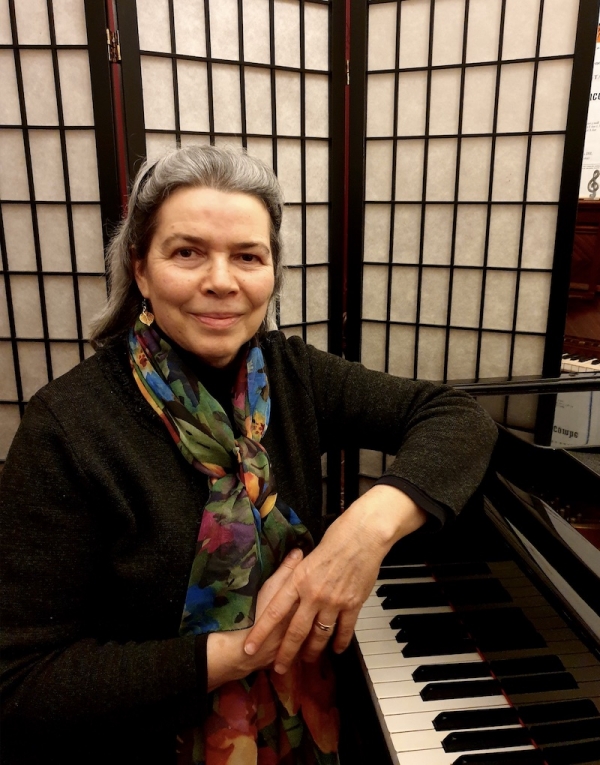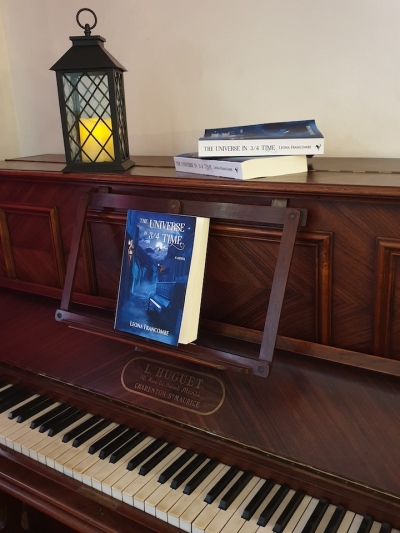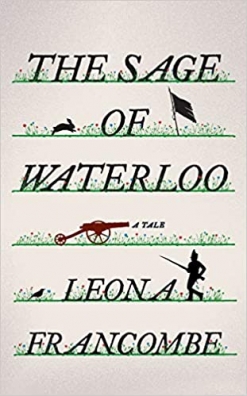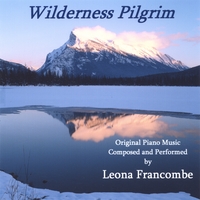This interview is a little different since it was inspired by a novel in which music plays a very important part. The author, Leona Francombe, is also a pianist/composer and contacted me last fall about reviewing her newest book,
The Universe in 3/4 Time. Her description of the book was intriguing, so I agreed to read the book and write a review. I am so glad I did, because it became one of my all-time favorite books! I've read it twice (so far!) and knew it would be fun to interview Leona and find out how the novel came into being. Also a concert pianist who calls Brussels (Belgium) home, we did this interview via email in January 2022.
KP: Hi Leona! How are you and how is life in Brussels these days?
LF: Hi Kathy! It’s such a pleasure to speak with you and meet your online community. Your site is truly an oasis…and not only for musicians. As I write these words, I’m looking out at the typical pearly-grey sky of our Belgian winters, and the bare branches of the two ash trees in our little walled garden. Covid has put a damper on the city, of course. The forest across the street where I walk most days is in hibernation. But I’m sure that all the creative people reading our dialogue will appreciate that such quiet times (and such grey weather!) tempt one to venture inward and see what the imagination has to say.
KP: It's also a great time to curl up with a great book! Speaking of which, I just finished reading The Universe in 3/4 Time for the second time, and I think I enjoyed it even more the second time! Even though I knew how the story ends, I just couldn't put it down, and I have to say that it's my favorite book that I've read in a very long time. The characters and settings are so vivid, the more philosophical passages are fascinating, the mystery and intrigue are compelling, AND it's a fantastic story.
LF: Well, first of all, I’m incredibly flattered and impressed that you read it twice! Thank you! I’m also thrilled that you enjoyed the undercurrents and deeper philosophy of the story. It’s always a gamble to include such things in a book meant for the general public. Global attention span seems to be shrinking rapidly, and many people want their information to be easily digestible these days. They also seem to crave a steady diet of sci-fi, sex and apocalypse, none of which (unfortunately for some!) can be found in my books. That said, I’ve been told that
The Universe in 3/4 Time is a page-turning adventure for those who simply want to be entertained, so that’s encouraging.
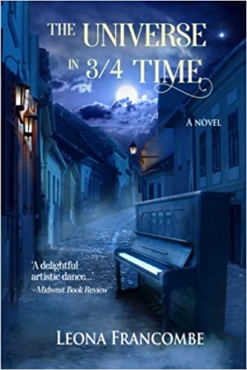
Click on the book cover
to go to Kathy's review.
KP: What inspired the book and how much of it is historical?
LF: You’re right, Kathy: there’s quite a mix of history and fiction here! Maybe I should start with the real-life event that inspired the novel: that is, my discovery of a WWII piano on the streets of Brussels one misty night about seven years ago. Here is an abridged version of the notes I wrote shortly after this encounter. Those who have read the book will recognize traces of Audrey Nightingale’s epiphany:
"Brussels, January 2015. Nightfall. I was rounding a corner near home when suddenly there it was: an antique upright piano seeping from the bitter mist like some sort of totem. I stopped dead. Any pianist would, seeing their chosen instrument exposed and vulnerable like that. Who would do this? I glanced up and down the moribund street: I was alone. I approached the piano. The perfect rosewood veneer was already starting to buckle in the damp air. My heart contracted. It might as well have been one of my children standing there, lost and shivering.
"I opened the fallboard, solemnly, as if knowing that this moment would somehow change my life. A Paris address was embossed in bronze above the keys and included a name that made me catch my breath: 'St. Maurice'. Was this Fate toying with me? You see, Maurice was the name of my beloved father, who’d passed away a few years previously. Not such a remarkable coincidence, perhaps, except that later research turned up no other brand of piano with that name on it. Whatever one’s views on chance, divine providence and the like, there was definitely a cosmic tremor abroad that night.
"I coaxed a few arpeggios from the foundling. The keys clacked like old dentures, but I was surprised that the tone had a mellow center to it. The houses dozed on. Our neighborhood has a uniquely Belgian stoicism, having survived two world wars without flinching, so no one seemed bothered by some misplaced piano music. I won’t go into the logistical feats and backaches of two people with their youth well behind them (my husband and I), dragging the piano home on an improvised board with wheels. At any rate, the combination of elegant rosewood, haunting resonance, and the possible intervention of a departed relative meant that adoption was without question...and a novel, inevitable."
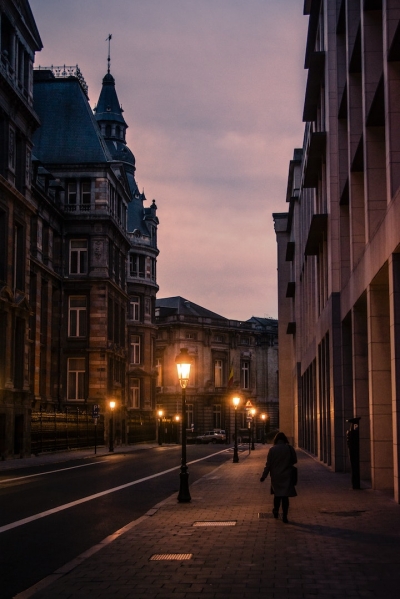
Old European street
KP: No wonder the passages about Audrey discovering the Nahoda piano are so vivid! Have Nahoda pianos ever existed?
LF: No. Actually, with all the twists of fate in the story, I wanted a particularly meaningful name for the piano. In Czech, “náhoda” means chance or coincidence, so I thought that with all the Czech aspects of the story, I’d go with that.
KP: Interesting! Were the characters of Audrey Nightingale or Konstantine Zar inspired by real people?
LF: It’s strange about characters. They all seem to be some sort of alchemy involving people you know, memory, dreams, or someone who might be standing next to you at the supermarket one day, or crossing a street. Brussels is a particularly rich hunting ground. There are characters on every corner! Sometimes I see someone so riveting, I’ll drop him or her into a story virtually unaltered. For instance, one day I spotted a very short, burly man heading out of the woods where I walk, scowling darkly. There was something furtive about him; something sorrowful, too. He was wearing a shapeless raincoat that reached almost to his ankles. He leaned forward as he walked, with his hands clasped behind his back like some kind of latter-day Beethoven. He went directly into the novel I was writing at the time, no alchemy required! Audrey’s landlady was a similar find; so was Nero, the misfit who hauls the piano away and actually lives in my neighborhood. People ask me if Audrey Nightingale is autobiographical…and whether I wear a cloche hat as she does! Well, to the extent that she’s a pianist living in Brussels, perhaps. But most of her other attributes are pure Audrey (including her hat!).
KP: Did someone like Zar inspire you as a young person?
LF: I feel so lucky to have been mentored by several extraordinary men during my life. (Women, too, it goes without saying, but we’re talking about Zar.) My father, of course. And several professors over the years, both in music and other subjects. The alchemy I mentioned before was definitely at work with the character of Zar, as he’s a mix of those remarkable real-life figures along with a certain melancholy romanticism I’ve always been prone to, and the dark enigma of so many heroes in the classic novels I’ve loved since I was young. (I’m also a sucker for 1940s films and their leading men!)
KP: I wasn't familiar with Johannes Kepler (1571-1630) before reading the book. Is he a well-known historical figure in Europe?
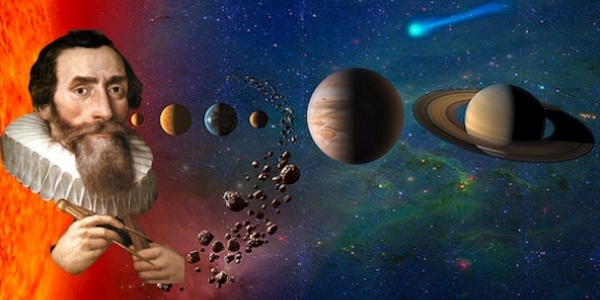
Johannes Kepler with planets
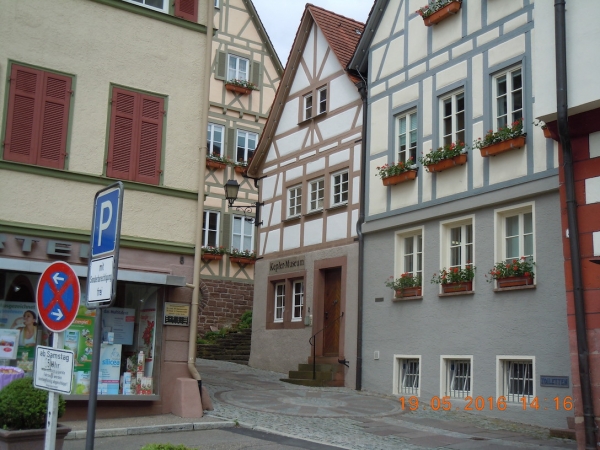
Kepler's birthplace
LF: He’s well-known in the scientific community. Actually, I wasn’t that familiar with Kepler myself until I did further research into a subject that has always fascinated me: the Music of the Spheres. I took a trip to Kepler’s birthplace in Germany—Weil-der-Stadt—which isn’t that far from Brussels by train, and discovered a world of intrigue and atmosphere that ended up driving the historical backstory. What I find so touching about Kepler and his moment in history is that he was the last great scientist to believe in the notion of cosmic harmony. (This is all explained in the book: Readers, come and explore!) After Kepler there came Newton, who, though he shared Kepler’s fascination with ancient philosophy, paved the way for modern science. These days, so-called “speculative music” has been consigned to history and philosophy classes and rarely appears in the music curriculum. Indeed, you’re in for a rough ride if you start talking about cosmic echoes in the middle of a rehearsal, believe me!
KP: Again - very interesting! Kepler and his studies are mentioned throughout the book, and The Kepler Trio, made up of three of the main characters (including Audrey Nightingale) was named for him. Was this, in part, to make more people aware of Kepler's work?
LF: Kepler gave the book a dimension that really appealed to me. I also liked the way his philosophy served to unite the generations of musical thinkers in the novel. I’m moved by his personal story: a frail genius caught up in the religious conflicts of the time. He was sickly, and had an unhappy, squabbling family life. I love the idea that as an astronomer, he found his peace in the night sky. I’m no scientist, that’s for sure! My father was a brilliant physicist, however, and I deeply admired his grasp of a “language” I never studied. Perhaps that’s one reason I wanted to get to the bottom of the scientific aspect of my own craft. After all, since ancient times music and science were inseparable. Music was once seminal to the classical curriculum and actually bridged the humanities and sciences: the trivium consisted of grammar, logic and rhetoric; and the quadrivium, of arithmetic, astronomy, music, and geometry. Just think of a time when our art was an integral part of learning and advancement! It’s hard to imagine, isn’t it? I found this idea more and more compelling as I researched the novel. I decided to use a secretive mystic—Konstantine Zar—as the means of communicating music’s powers of illumination. It’s my hope that fellow musicians will also be inspired by his message.
KP: One of the things I find fascinating about the book is the way it easily moves back and forth through time - the 1500s and 1600s, the World War II era, and contemporary times - and really makes the point that we are all related and part of a continuum. Was that intentional?
LF: Yes, it was. But the book’s journey through time only took shape as the plot did. At first, all I had to go on was that mysterious piano, rescued from the mist. Then I found out from my tuner that it had been built sometime during the 1930s or 1940s, which added the WWII dimension. (Brussels during the Occupation has always fascinated me, too.) The atmosphere of Old Europe and my own roots here helped complete the picture. My father’s name on the piano launched the mystical element, which in turn led me to the Music of the Spheres, Plato, Kepler, etc. So you can see that the book had a gradual, organic birth, and as a result, time periods wandered about somewhat until I could pin down the plot and characters and link their historical realities in a logical and compelling way. In fact, the notions of cosmic music and universal harmony are the true links between time periods.
KP: I was fascinated with Audrey's life and how so many seemingly random events had such an enormous impact on her: the priest who found her as a very young infant, the school janitor who recognized her potential as a musician, the "death" of the piano she loved so dearly when it was dropped from a crane, finding the Nahoda piano on one of her late-night walks, etc. Were you intentionally making the point that nothing happens by accident or that everything happens for a reason?
LF: Fate…destiny…chance…they are all important to the story. I hope that readers will feel free to interpret them in whatever spiritual or rational context they prefer. I think that if we look at our own lives, so many things seem to happen for a reason—even bad things—that it’s difficult not to imagine that we are guided, ever so gently, by a force we can’t explain. A cosmic presence? Our own conscience? I’ll leave it up to you. With all the misery and disaster in this world, it’s hard to maintain that this “presence,” whatever it is, could possibly be benevolent. However, when music graces the direst of circumstances, as it does in the novel, then benevolence most surely does, too.
KP: Although many of the plot lines are resolved by the end of the book, does Audrey find Jonas again and do they live happily ever after? Do you plan a sequel or do readers need to decide for themselves once they finish the book?
LF: I’m so tempted to write a sequel! When you spend years with characters it’s hard to say good-bye. But I’m afraid that it all depends on the tough demands of the publishing world, on how well this novel does, etc. For now, rest assured that Audrey is on the train to Hamburg to see Jonas and make amends. What they do when she gets there is anyone’s guess!
KP: You have had a fascinating life as a pianist, composer and author. You were born in England and grew up in the US. You graduated magna cum laude from Bryn Mawr College with majors in Russian and Music and later received a Master’s degree from Yale School of Music. You have given solo recitals in the US, Czech Republic, Liechtenstein, Belgium, England, Germany and France, and performed in collaboration with orchestras and ensembles all over the world. You debuted with the Pittsburgh Symphony Orchestra at the age of sixteen. That's really impressive! Do you still perform much?
LF: I play on occasion in private concerts, but mostly I compose and record, and I work with colleagues who are interested in performing my compositions. At this particular time of my life, I find it most satisfying to do all this from my home in Brussels and use the Internet to promote my music and writing.
KP: How many books have you written?
LF: I’ve written six full-length novels, three of which have been published.
KP: Do they revolve around musical themes as well?
LF: Music is a deep theme in all but my 2015 tale, The Sage of Waterloo, although even there, I couldn’t help adding a few otherworldly tremors and echoes. It was a battlefield, after all! My very first novel is a suspense story inspired by an 1805 manuscript I discovered in the Brussels conservatory library on the subject of music’s healing powers. It was a revelation! I really hope that the book will see the light one day.
KP: You composed a piece called "Kepler's Waltz" that really sets the tone of the novel. There is a
beautiful video on your site where the piece plays behind images of places written about in the book. Tell us about that piece and what inspired it.
LF: My first musical book trailer was for The Sage of Waterloo, in which I used photos of the battlefield to accompany a piece that I hoped captured some of the tragic, haunting atmosphere of the place. This was such an enjoyable project—not least because I had the opportunity to work with my son, Nicholas, who’s a graphic artist and helped with the montage. So I decided to do the same with subsequent books. “Kepler’s Waltz” is an atmospheric excursion in A minor that follows the journey the musicians take in The Universe in 3/4 Time. I had to be careful not to add any photos that might be spoilers, so some of them are more a depiction of the mood rather than of an actual location. I knew that I wanted to compose a melody around a minor second, and specifically, Mi-Fa-Mi: the interval that Kepler came up with for the Earth in his planetary scheme. (Again, this is explained more fully in the book). This is what Kepler said about that interval in his Harmonices Mundi: “The Earth sings Mi-Fa-Mi: you may infer even from the syllables that in this our home, misery and famine hold sway.” It is, indeed, a doleful sentiment. But it’s important to the story. In her improvisation around this interval, Audrey comes up with a waltz tempo, so perhaps this lightens the mood somewhat!
KP: I know you have composed quite a number of other piano solos. Do you compose for other instruments and ensembles, too?
LF: The music I hear in my head is often for all sorts of instrumental combinations. But realistically, I had to decide early on that if I wanted to write books in addition to music, and do justice to them both, I couldn’t possibly find the time to compose for other instruments as well as my own. I’m also adamant that whatever I create should be satisfying to play both on a technical and emotional level, and I can only do that with the piano.
KP: I love this quote from your bio: "she can be found most days coaxing narrative from music and melody from words." They are more closely-related forms of storytelling and communication than a lot of people realize. You are also fluent in a number of languages, which is also an important part of communication. All of these things come together to give you a unique voice and perspective as both a writer and musician. Have you found that female writers have to deal with some of the same challenges as women in music do?
LF: Thank you for those comments, Kathy. It’s amazing how many creative pathways music and writing share. Actually, I think that women in all walks of life still face hurdles at every turn. As for my writing life, I have to confess that I’m a bit of a hermit, so I rarely encounter sexism...not that it doesn’t exist. I’m more in direct touch with musicians than I am with writers, although I keep up with many online forums. Also, there’s a certain disconnect involved in being an English-speaking author writing almost solely about Europe, and then trying to make inroads in the U.S. market. These discrepancies, along with the fact that my writing doesn’t fit conveniently into any particular genre, create more challenges than my gender does.
KP: It drives me crazy that everything seems to have to fit into some sort of box in order to be marketed effectively. There is something very wrong about that, but I don't know what any of us can do about it! I can remember when I was in art school in college being told repeatedly that great women artists just don't exist - never have and never will. That was back quite a few years ago, but as hard as I tried to not believe that, it had a strong effect. Have you had to deal with much of that?
LF: You know, when I was in music school, a male colleague told me that the reason there haven’t been any famous women composers in history is because women give birth, and therefore they don’t have the need to be creative in other ways. Believe me, had I been able to throw a piano at him, I would have! Times have changed since then, thankfully. (And my piano-throwing days are over.) Female composers are not that unusual any more. Nor are female conductors, who are even becoming part of the mainstream. I’ve uncovered a surprising number of women composers from centuries ago who are gradually emerging into the light: Clara Schumann is one of the most famous, of course. (She was also a virtuoso, a teacher, and had eight children, so that’s quite a beacon for those of us who had to carve out practice time around small families!) There are many French women I’ve come across whom I love, such as Cécile Chaminade and Louise Ferrenc. The latter composer was performed in the novel by Audrey’s trio for their big concert at the European Commission (which for non-musical reasons ended in disaster!). Hélène de Montgeroult is also wonderful. These are just a few. And let’s not forget the 11th-century mystic, healer, writer and musician, Hildegard von Bingen.
KP: Yes! What's up next for you?
LF: There are endless tasks to be done to promote this book, as I’m working without an agent, so the next writing project is on hold for a while. I do have a fairly good idea what the next novel will be, however. I’m also engaged in notating a few pieces that I composed over the winter during the pandemic, so that will take some time.
KP: Is there anything else you'd like to "talk" about?
LF: I could talk with you about these things all day, Kathy! It’s been delightful. Thank you so much for this opportunity to be a part of your forum. I suppose I would just like to say to your readers: please, embark on the journey in The Universe in 3/4 Time. You won’t regret it! The substance we all work with every day as musicians is full of revelation. No wonder it was enshrined by the greatest philosophers. You’ll discover new horizons so wide, they’ll take your breath away.
KP: It truly is an amazing book! It's available in paperback or as an eBook from
Amazon.com. Thanks so much for taking the time to chat with me, Leona!
For more information about Leona Francombe, her books and her music, be sure to visit
her website and her
Artist Page here on MainlyPiano.com.
Kathy Parsons
January 2022

